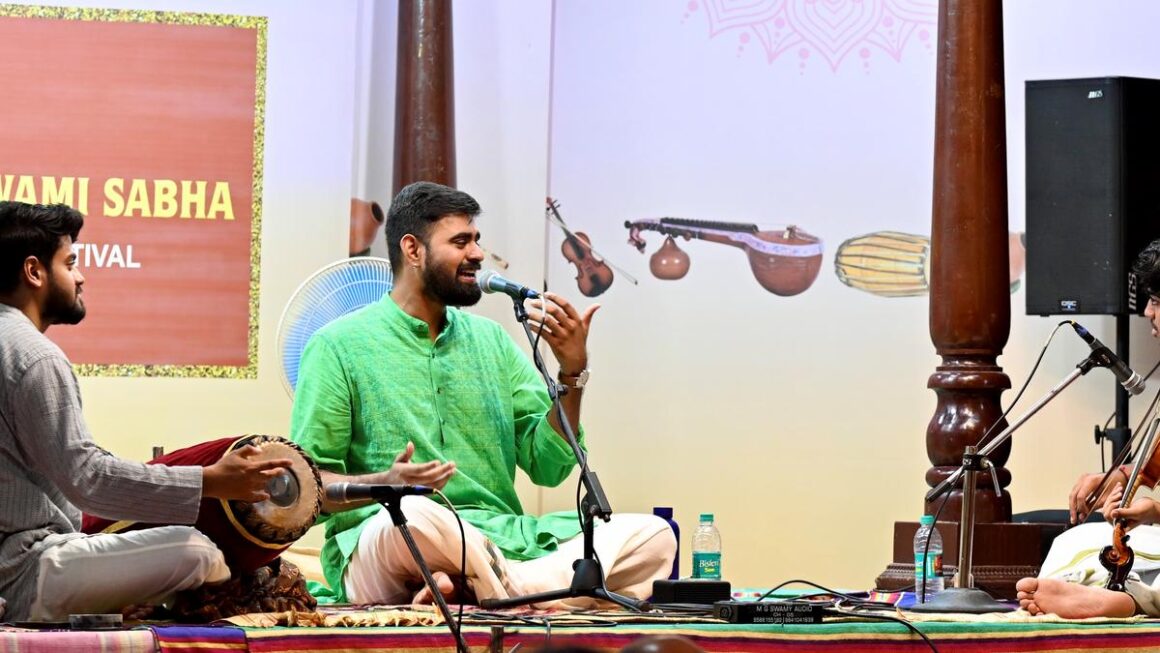
Adithya Madhavan with Bhargav Tumkur (violin), Kishore Ramesh (mridangam), and Nerkunam Sankar (kanjira).
| Photo Credit: RAGHUNATHAN SR
A free-flowing baritone voice, nuanced raga singing ability, and a fairly good understanding of the values of classical music were the key ingredients of Aditya Madhavan’s recital at Sri Parthasarathy Swami Sabha. Accompanists Bhargav Tumkur (violin), Kishore Ramesh (mridangam), and Nerkunam Sankar (kanjira) added lustre to the presentation.
Aditya’s rendition of the Saveri varnam ‘Sarasuda’ by Kothavasal Venkatarama Iyer exuded a breezy charm. He then sang Tyagaraja’s ‘Girirajasutha’ in the rare raga Bangala, which is an unusual kriti for good measure. It is in Sanskrit, and the deity is Ganesha; the raga comprises flat notes, devoid of gamakas. His kalpanaswaras at the song’s opening were lively, but a shorter one would have been better. It would have helped him avoid hasty and repetitive phrases in a few places.
Adithya Madhavan.
| Photo Credit:
RAGHUNATHAN SR
Grandeur marked Aditya’s Bhairavi raga essay, which unfolded methodically, yet was leisurely and refreshing. The liberal use of gamaka-laden phrases and pregnant pauses lent a classy dimension to it. Bhargav was equal to the task with the bow, delivering a neat delineation of his own. ‘Upacharamu jesevaru’ in Rupakam is a moving composition in which Tyagaraja implores the Lord to not forget him, and Aditya did justice to the emotion with an evocative rendition. The niraval at ‘Vakitane padhilamuga’ (not ‘pathilamuga’ as was sung) too brought to the fore his deep musical instincts.
A quick foray into Saranga introduced ‘Kanmaniye solladi’, a composition on Muruga by Mazhavai Chidambara Bharati, which was capped with sparkling kalpanaswaras. Aditya then reaffirmed that raga alapana was his forte with a dazzling Bilahari, bringing out the hues and shades of the audava-sampoorna melody. Bhargav excelled again with a pleasant response.
‘Naa jeevadhara’, the chosen kriti, is a Tyagaraja classic, which comprises only metaphorical vocatives and offers much scope for sangati exploration. The beauty of this composition is best brought out in a meditative pace, but Aditya preferred to sing it fast. This sacrificed some of the composition’s finesse, as intensity took precedence over serenity. Though Aditya fared better in the swara segment with the same rush, the odd off-the-mark notes surfaced in the rapid flow.
Bhargav and Sankar, the percussion partners, embellished the concert with sensitive play, and their tani avartanam (two-kalai Adi tala) was short and zestful.
Subramania Bharati’s evergreen ‘Chinnanchiru kiliye’ in ragamalika (Kapi, Maand, Vasantha, Tilang, Neelamani, and Neelambari) and a Tiruppugazh in Surutti set to Chatusra Dhruva tala brought the concert to a close, leaving the kritis of Dikshitar and Syama Sastri unrepresented.
Aditya has a strong grasp of the basics, and a slight adjustment of tempo would lend his music greater control and make it more polished.
Published – December 31, 2024 06:09 pm IST


Leave a Reply